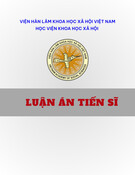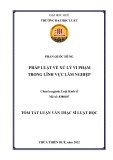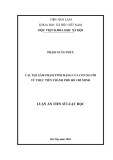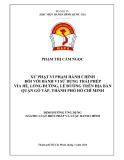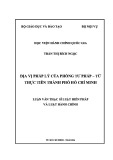
VIETNAM ACADEMY OF SOCIAL SCIENCES
GRADUATE ACADEMY OF SOCIAL SCIENCES
TRAN THI QUYNH
EXEMPTION AND REDUCTION OF PENALTIES IN
VIETNAM CRIMINAL LAWS
Major: Criminal law and criminal procedure law
Code: 9.38.01.04
SUMMARY OF DOCTORAL THESIS IN LAW
HANOI, 2020

This thesis is submitted at:
Graduate Academy of Social Sciences
Supervisor: A/Prof.Dr. Cao Thi Oanh
Reviewer 1: Prof.Dr. Bui Minh Thanh
Reviewer 2: Prof.Dr. Nguyen Xuan Yem
Reviewer 3: Assoc. Prof.Dr. Cao Thi Oanh
This thesis is defended before the Doctoral Thesis Panel at:
The Graduate Academy of Social Sciences….. at……., on … day….. month….
year…..
The thesis is available for reading at:
- Graduate Academy of Social Sciences Library
- Vietnam National Library

1
INTRODUCTION
1. Importance of the research
In crime prevention, penalties against natural or corporate legal
entities are not always the most effective measure meeting requirements of
criminal policies and basic princials of criminal laws (for example,
classification of penal liabilities, humanity, equality). Therefore, in addition
to penalties, it is important that criminal laws provide for exemption and
reduction of penalties as alternative measures to implement policies and
principles of criminal laws, ensuring effectiveness of criminal laws in crime
prevention.
In the history of Vietnamese legislation, exemption and reduction of
penalties are considered special humanitarian decisions during trial by the
courts. Exemption and reduction of penalties against natural persons and
corporate legal entities by the courts do not affect the deterrent and punitive
nature of the laws. Penalties are exempted by the courts if no longer needed or
are reduced if deemed sufficent to punish, deter and prevent future crimes.
Moreover, exemption and reduction of penalties not only reflect humanitarian
policies but also save costs for coercive measures, promoting honesty,
encouraging natural persons and corporate legal entities to re-educate in order
to rehabilitate into the community as good citizens of the society, and
increasing awareness on legal compliance of legal entities. However, from
three aspects of theory, legislation, and trial, provisions on exemption and
reduction of penalties still have shortcomings. Therefore, I (PhD candiate)
have decided to choose “Exemption and reduction of penalties under
Vietnamese criminal laws” as the title of my Doctor of Law Thesis.
2. Purpose and scope of research
The thesis aims to develop theoretical framework on exemption and
reduction of penalties, identifying directions and issues for improvement,
making recommendations for proper application in order to effectively
prevent crimes and protect human rights.
As the thesis falls under the category of Criminal Law and Criminal
Procedure Law (Code 9 38 01 04), its scope of research includes:
Firstly, in terms of theory, the thesis looks at exemption and reduction
of penalties as institutions reflecting penal liability classification policies,
humanity and equality principles of criminal laws from scientific point of
view. Meanwhile, from legal application aspect, exemption and reduction of
penalties are analysed as punitive decisions of the courts under which judges
are empowered to assess and make decisions on exemption and reduction of

2
penalties based on extenuating circumstances of defendants as specified in
Article 59, Article 88, Article 390 of the Penal Code, Point 4 of Article 91
and general provisions on reduction of penalties based on extenuating
circumstances mentioned in Article 51 of the Penal Code as well as specific
provisions on reduction of penalties in Article 54 of the Penal Code on
applying sentences lighter than the lower limit of the penalty bracket, and
relevant general provisions on exemption and reduction of penalties. The
thesis does not cover reduction of penalties relating to preparation for crimes,
attempts and criminals under 18 years old, nor reduction of penalties relating
to specific crimes committed by special criminals who are subject to fixed
statutory (legislative) provisions on reduction of penalties without required
extenuating circumstances, or whose sentences are reduced on the basis of
extenuating circumstances or at the discretion of judges during trial. In
addition, the thesis does not focus on exemption of serving sentences or
reduction of sentence duration as such exemption and reduction relate to post-
trial period during judgment enforcement.
Secondly, in terms of practice, the thesis analyses and assesses
application of provisions on exemption and reduction of penalties by the
people’s courts at all levels from 2010 to 2020, pointing out achievements,
shortcomings, weaknesses and reasons.
3. Research methodology and methods
3.1. Methodology
The research is conducted in line with methodologies of Marxism
and Leninism, Hochiminh thoughts, guidance and directions of the Party
and the State on criminal policies and judicial reform. The thesis also
looks at exemption and reduction of penalties from the inter-sector
approach of social sciences and jurisprudence.
3.2. Research methods
Therefore, in order to achieve research objectives and purposes, the
following methods are used: 1) Integrated method; 2) Analytical method; 3)
Histotical method; 4) Statistical method; 5) Comparative method; 6)
Observational method.
4. New scientific contributions of the thesis
This is the first comprehensive and systematic research on theoretical
and practical issues relating to exemption and reduction of penalties in
Vietnam criminal laws in the form of a doctoral thesis.
The thesis specifies importance and basis of provisions on exemption
and reduction of penalties in Vietnam criminal laws. The thesis then
develops a definition, identifying basic features of exemption and reduction
of penalties.

3
The thesis systematises provisions on exemption and reduction of
penalties in the history of Vietnam criminal legislation from the end of the
August Revolution 1945 to the issuance of the Penal Code 2015. At the
same time, based on comparision between provisions of Vietnam Penal
Code and those of criminal laws in some countries, the thesis makes
comments and recommendations. Accordingly, for the first time, provisions
on exemption and reduction of penalties against criminals and corporate
legal entities in the Penal Code 2015 are analysed in comparison with
provisions of the Penal Code 1999 based on classification of cases using
various criteria.
Noticeably, based on analysis of application of provisions on
exemption and reduction of penalties by the People’s Courts from 2010 to
2020, the thesis points out shortcomings, weaknesses and main reasons.
Conesequently, the thesis is the first paper making recommendations on
improvement of legal provisions on exemption and reduction of penalties in
the Penal Code 2015, proposing solutions for proper application in practice.
Chapter 1
LITERATURE REVIEW
1.1. LITERATURE REVIEW
1.1.1. Literature review of national works
There has been no comprehensive work on exemption and reduction of
penalties as a doctoral thesis. The author is the only one who completed a
master’s thesis on exemption of penalties. Moreover, only few researches on
exemption and reduction of penalties are published in specialised law
journals or as part of textbooks, monographs, reference books in the form of
an issue (relevant aspect) of other institutions such as sentences, decision on
sentences, sentence exemption or commutation, or extenuating
circumstances.
1.1.2. Literature review of international works
Internationally, there is no comprehensive and specialised study on
exemption and reduction of penalties under Vietnam criminal laws. Number
of studies on exemption and reduction of penalties are fewer than those on
other institutions such as sentences, penal liabilties, crimes or general
provisions in criminal laws.
1.2. ASSESSMENT OF SCIENTIFIC WORKS AND ISSUES
FOR FUTHER RESEARCH
1.2.1. Assessment of national and international scientifc works on
the thesis’s topic
While overview on national and international works in Section 1.1

